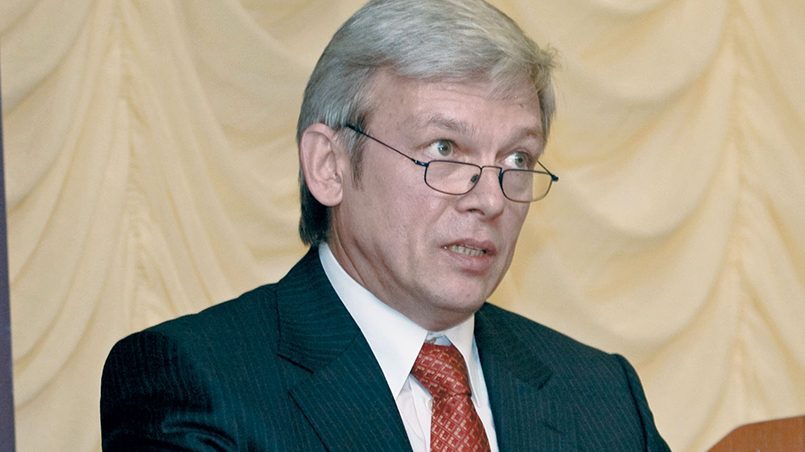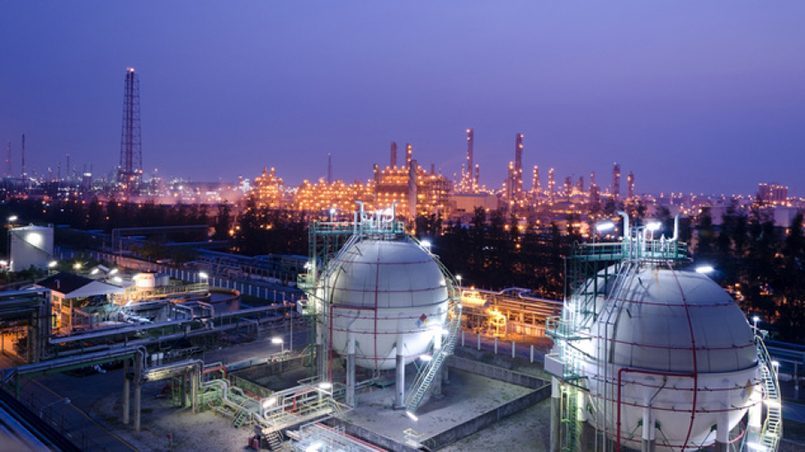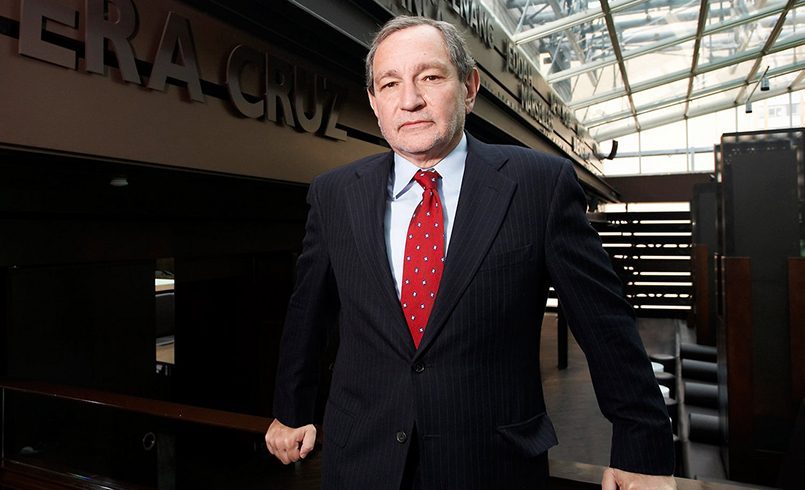KyivStratPro economics expert Sergey Lepeyko during a press conference in Kiev gave an unexpected answer to the Ukrainian government: instead of decreasing Russian gas shipments, he told to increase them. Otherwise, as Lepeyko stated, the Ukrainian gas transit corridor may be abandoned before the Nord Stream 2 even enters operation. The Kiev expert’s opinion sounds reasonable with Germany permitting the construction of the new pipeline. But the fight against Russian gas in Europe is far from over. RuBaltic.Ru sat down with Advisor to Gazprom Export CEO, Co-chair from Russian side of Worstream 2 “Internal Markets” Russia-EU Gas Advisory Council, professor of the International Oil and Gas Business department of the Gubkin Russian State University of Oil and Gas Andrey KONOPLYANIK.
— Mr. Konoplyanik, previously you said that the fight against Nord Stream 2 is purely based in economics. In your opinion, America’s ultimate goal is to push Russia out of the European gas market?
— I believe that the intention to replace Russian gas with American LNG in Europe is just the first step. I also see this as USA’s attempt at fixing another global macroeconomic problem. I imagine that the world market today, especially the innovative technology market, competition grew more severe, because new players are emerging alongside countries with a long history. The three traditional centers of power in innovative technology (North America, Europe and Japan with the Asian Tigers from South-East part of the continent) and here come the new challengers: China, India and other countries. They are all fighting to up their global competitiveness and to expand their competitive zone in the world economy.

The question arises: how can USA retain their dominating position in World economy, which they assumed due to beneficial circumstances in the 20th century?
That included two World Wars (both away from USA’s continental borders, where they sold weapons and other industry to the warring countries, which let America’s economy a boost in the war years) and the two post-war restoration periods (when the war-torn Europe and Asia was done on American money, more precisely on American credits, which tied into buying American industry and machinery, production of which gave the post-war USA economy a boost as well) in a significant part defined the American economic and financial rise and led to the domination of USA in the World economic and financial systems.
Currently, USA lacks these beneficial circumstances, and I hope they don’t get them. So in order to keep their competitive positions, they don’t have many options in this metaphorical race: either run faster than their competitors or get rid of the competitors. Or, say, put some broken glass in their competitor’s boots to undermine them.
Some don’t take my assumption seriously, but I will risk mentioning it again: the Americans are just trying to get rid of a competitor, to remove the weakest link. And the weakest link in the new competition – Europe. As they say, nothing personal, just business.
The European Union is full of contradictions, part of which were initiated by the US. The various “Arab Springs”, which our American friends had a hand in, ended up hitting Europe in the end (the refugee crisis, etc.)
The issues of the EU’s internal mechanisms also came to light. It “swallowed” too many new countries and is still struggling to “digest” them. Europe did not homogenize: There is the Old Europe and the New Europe. The New Europe countries, before joining the EU, hand fifteen years of preparation courses for smooth integration into the European economic integration, learning to live by the European rules.
And this created the false expectation that they would be among equals in the European Union. That is where the good life starts! But it never happened. The false expectations gave way to deep disappointments. The flow of investments from Brussels, which could have balanced the economic levels out, never came. Then, as part of NATO, they started directly conversing with their trans-Atlantic colleagues, looking for support (which can be converted to economic aid).
And I see this as one of the reasons for Lithuania, Latvia, Estonia, Poland and other East European countries anti-Russian rhetoric. The hyped up “Threat from the East” leads to NATO’s expansion, and the arrival of military bases and military contingents in these new EY countries launches the direct investment mechanics along with multiplicative effects of these investments. Not with the help of the expected “peaceful” investments from Brussels, but with the “military” investments via NATO.
The new EU members in the East also have the American LNG on the horizon. That is the additional element, which helps solve the specific economic goals. They are looking for profit. Many Polish politicians, for example, don’t hide the fact they would turn down Russian gas in favor of American LNG and re-export it to Ukraine. I will emphasize that this is about solving an economic goal.
But if the solution to the problem leads to various countries dropping Russian gas (for example, replacing the cheaper Russian pipeline gas with the more expensive liquefied American gas) this leads to the energy going up in price in European production and less competitiveness for Europe in the world market in the cutting-edge “peaceful” industries, where the main competition is taking place. And our American friends have a chance to broaden their own competitive reach.
I think that the solution to the energy problem is not the ultimate goal for USA, but more of an intermediate one. They are fanning the Ukrainian fire for this as well. This is what that the Countering America's Adversaries Through Sanctions Act (CAATSA) is for. Article 232 speaks of imposing sanctions against those participating in Russia’s export pipelines. And the article 257 mentions the truth: turns out they need to increase export shipments, because it will create new jobs in US.
Aside from this, the article is dedicated to Ukrainian energy independence. But it turns out that Ukraine’s energy independence is just a method for US to solve their internal problems.

Again, knowing all this, I would not say that the current opposition to the Nord Stream 2 is the decisive battle. As the aforementioned article 257 said, the fight against the pipeline is part of USA’s policy. So it will continue with any outcome of the “fight”: it is just one in a line of actions in this shifting world energy economy. Partially these changes are a result of the American shale revolution. Many don’t consider it a revolution, while other hotheaded people say it was the CIAs doing.
I have a different point of view: the American shale revolution actually took place and turned the world upside down, and the chain reaction is longwinded and multifaceted, going way beyond the energy field (for example it radically “turned around” the World’s direct foreign investments into the refining energy industry.) In these conditions, USA resolve their practical problem, we resolve ours. These interests clash in Europe.
— It is noteworthy that US State Department said they put a lot of time into negotiating with their partners and allies across the ocean, explaining the CAATSA consequences. This means that the “partners” and “allies” are resisting.
— That is so. But why do they resist? Different experts (the economically-minded) realize that it is against Europe’s interests to shut down the Nord Stream 2, because upon completion it would lower costs of gas transit to Europe. And that means that Russian gas competitiveness remains, even if the European prices drop. American LNG is already sold at a loss in Europe. And that means that USA needs the gas prices in Europe to rise. The Nord Stream 2 is an obstacle in that sense. So obviously, they need to get rid of the competition. And they are looking for some noble reason to do so.
Any cooperation must be mutually beneficial. If one side’s profit is a loss to the other, then it is no longer cooperation.
— Do the Europeans have the nerve to consecutively going through with this and go into a trade war with the US?
— I don’t want to repeat the common opinion that Europe is de facto occupied territory, thus, a non-independent entity in decision making, but that is a strong argument. Remember how many years it took Germany to get information on its gold reserves, which were partially stored in the States? EU is definitely the junior partner in this. That is why the Europeans are resisting, but only in their weight category.
East European countries are currently playing the “Russian Threat” card, and the politicians, who understand and protect EU’s interests are forced to maneuver. And it is hard for them.
An example. There are different ages of the energy regulation system in Europe – the so-called Energy Packages. Since 2003, the Second Energy Package, Europe started building a unified gas market. If there is a united internal market, then any shipment to any EU country is a shipment to the EU. It does not matter where the entry point is. This is written in the Second Energy Package.
But what is the rhetoric we hear from the US and even many EU countries when speaking out against the Nord Stream 2? That de-facto these are shipments to Germany and that it leads to Germany’s domination within the EU, making Germany the EU hub for natural gas, reselling it to the rest of Europe… So a boost to Germany. I get drawn into arguments about this a lot where I say, “Read it up, check your own laws.”
Shipments to any EU country are shipments to the EU. If you can’t maintain a non-stop supply of foreign gas through the EU, if you don’t invest in internal pipelines between specific countries (interconnectors), then that is not our problems and not our responsibility.
Many disputes arise for two reasons: first, pardon my bluntness, the incompetence and ignorance of their own laws, second, internal disagreements.
But there is an important nuance. George Friedman, founder and chairman of America’s leading private geopolitics intelligence and analytics company Strategic Forecasting Inc. (STRATFOR), which are called the shadow CIA, said in his Chicago global affairs council on 4 February 2015 that USA’s end goal in Europe is the construction of the Intermarium territories between the Baltic and Black Seas, “a concept dating back to Piłsudski.

According to Friedman, for US, the first goal is to not allow German capital and German technologies unite with Russian natural resources and workforce into an undefeatable combination. USA have been working on this for a whole century. USA’s trump card for this combination is the line from the Baltic and Black seas. Germany is one the strongest economic powers, but also a very fragile in the geopolitical sense. The construction of such a barrier, according to Friedman, is a lot more important for Washington than fighting radical Islam, which is “a problem, but not a major threat to USA.” Ultimately, Friedman defined America’s goals as building a cordon sanitaire around Russia, with which they could hold Germany and all of the EU on a short leash.
There are two different Europes, but there must be a joint solution. In addition to everything, the Baltics and Poland hold a grudge, because Gazprom started working on Nord Stream and Nord Stream 2 instead of the alternate Amber project.
Amber was more of the same, but the pipeline would not go by sea, instead going through the Baltics and Poland. They would have gotten additional revenue from the transit. In this case, they are just tallying up the money they would have made. The unfinished Amber pipeline is costing them money? It is Russia’s fault.
Sadly, the clash between American and Europe is due to the junior role relegated to the latter. The Europeans have found the will to turn down the new trade agreements with the US (the terms must have been completely unacceptable for that to happen), but sometimes they lack the bravery and capability to fight for their interests, especially with the serious internal issues. But the search for new solutions takes too much time, this concerns long-running processes.
— And the US, in turn, are not going to back down?
— They always try to force their interests. I had to work a lot with Americans in Egor Gaidar’s government (I headed the Russia-USA work group on oil and gas in the intergovernmental commission), and later was a council during Gaidar’s second term in the government.
He put the late Alexander Arbatov and me in charge of the state inquiry into one of the big gas and oil investment projects, which was supposed to be a joint effort with our American colleagues. The American agreement, according to me and Arbatov, was absolutely unacceptable. But the US partners had a clear view on this: either we accept their terms with no alterations, or the project won’t happen at all. All or nothing.
As a result they spent six years with their unchangeable terms and never got the approval. These people tend to be unnegotiable. Their policies are based on their beliefs, that they are the spreaders of democracy and thus, can do as they please. And that they are always right. And “America First”.
Translated by Pavel Shamshiev







